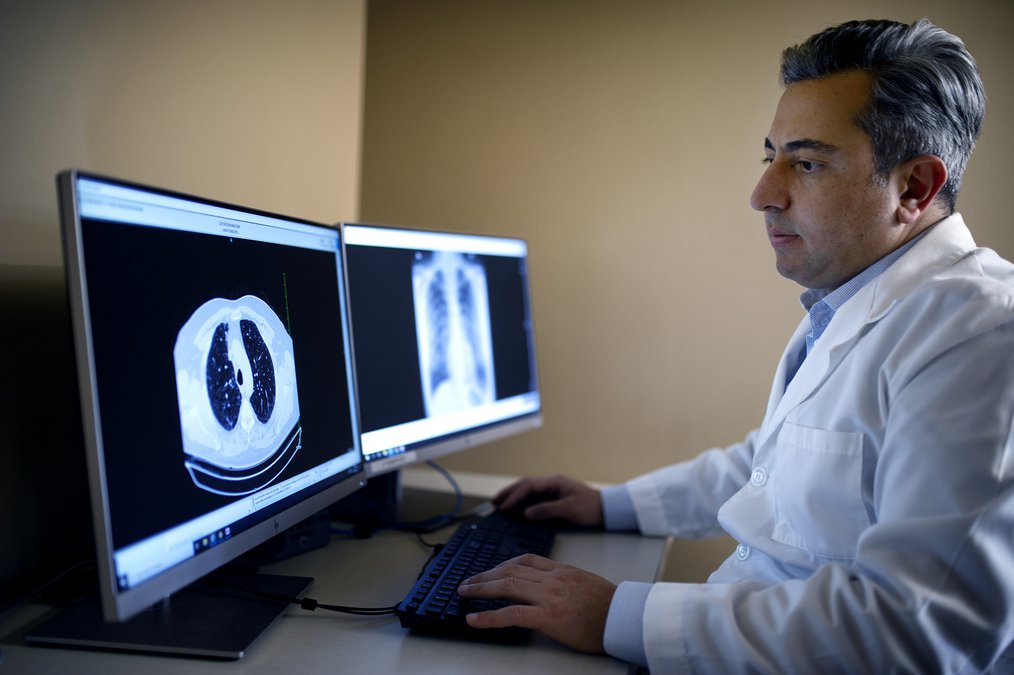By Nick Watson, The Times
Despite decreases in smoking use, lung cancer remains the most prevalent cause for cancer-related death across the country and in Georgia.
Lung and bronchus cancer had 2.5 times as many deaths as colorectal cancer, the form with the second-most deaths in Georgia in 2017, according to the Centers for Disease Control and Prevention.
“If someone who smoked an average (of) one pack per day for 40 years, (they have) about 20 times the risk of developing lung cancer compared to someone else who has never smoked,” said Dr. Rami Arfoosh, who is part of the Pulmonary and Sleep Specialists of Northeast Georgia.
According to the CDC, cigarette smoking among American adults decreased from 20.9% in 2005 to 13.7% in 2018.
Outside of smoking, Arfoosh said the medical community has learned more about second-hand smoking and other environmental toxins such as radon that can lead to lung cancer.
Radon, a tasteless and odorless gas, causes at least 20,000 cases of lung cancer each year, according to the Environmental Protection Agency. The gas comes “from rocks and dirt and get trapped in houses and buildings,” according to the CDC.
“Nearly one out of every 15 homes in the United States is thought to have high radon levels,” according to the CDC. “The EPA recommends testing homes for radon and using proven ways to lower high radon levels.”
People who have had radiation therapy for other cancers also carry an increased risk for lung cancer, Arfoosh said.
In Georgia, the age-adjusted cancer death rate was 155.4 deaths per 100,000 people in 2017. There were 17,135 cancer deaths in Georgia that year.
There were also 52,690 new cancer cases reported in 2017.
CDC maps of lung cancer cases and deaths show higher rates in the South and Midwest states.
“It’s very well known that there is a gap in potentially preventable death between the most rural areas and urban communities,” Arfoosh said. “This gap has widened for certain conditions such as cancer, chronic respiratory disease and heart disease.”
Though cigarette smoking has decreased, Arfoosh said vaping and electronic vapor products have become an “emerging risk.”
“Although the overall use among (the) overall population and adults in general may not be horrible compared to smoking cigarettes … the increased use among youth is a big problem,” Arfoosh said.
With 159th being the highest risk, Hall County ranked 116th out of 159 counties in Georgia for middle-schoolers reporting using electronic vapor product within the past 30 days, according to the Georgia Social Indicators Study. Hall County high schoolers were 76th out of 159 on electronic vapor product use.
Comparatively, Hall County middle school students were 35th out of 159 on tobacco use, with their high school counterparts ranking 13th out of 159.
“Young people started using vaping not having any idea that there was any danger to it,” said Judy Brownell, the director of prevention at Center Point. “All they thought was it was mist, flavoring, water.”
Because of the novel age of electronic products compared to cigarettes, there is still a lot to learn about vaping and what health effects it may have down the line.
“Most carcinogenic compounds take years to cause cancer, so we’re not going to have an answer immediately,” Arfoosh said. “In the old days, people didn’t know that smoking cigarettes can cause cancer. It took years of use to show the relationship. There might be other compounds that we don’t know about.”
For the decrease in smoking tobacco to be meaningful, Arfoosh said “we need to make sure that electronic cigarette use is not increasing and hopefully decreasing and being eliminated.”
Gov. Brian Kemp signed Senate Bill 375 July 22, which made it illegal to sell “cigarettes, tobacco products, tobacco-related objects, alternative nicotine products or vapor products” to anyone under the age of 21. It also made it illegal for minors to buy these products.
If someone under the age of 21 violates the law, the punishment is a $25 fine and no more than 20 hours of community service.
Not complying with the punishment or a second offense within 12 weeks will lead to a 45-day license suspension.
“There is some remedy for them that is a little more serious,” Brownell said. “When you lose your license, that certainly restricts your mobility.”
Unfortunately, many people experiencing symptoms of lung cancer may have it at a stage that might not be curable, Arfoosh said. Those symptoms may include coughing blood, unexplained weight loss, shortness of breath or hoarse voice.
“Lung cancer is treatable when it’s found at its earliest stage, which is usually stage one. Studies have shown that people who undergo the screening for lung cancer has about 70-90% chance of finding the cancer at stage one,” Arfoosh said.
The Centers for Medicare and Medicaid Services issued a memo in 2015 to make screening with low dose computed tomography an “additional preventive service benefit” for those 55-77 without signs or symptoms of lung cancer. They also have to have a 30-year history of smoking one pack per day.
Current smokers or people who have quit within the past 15 years are also eligible.

